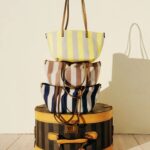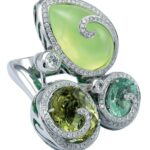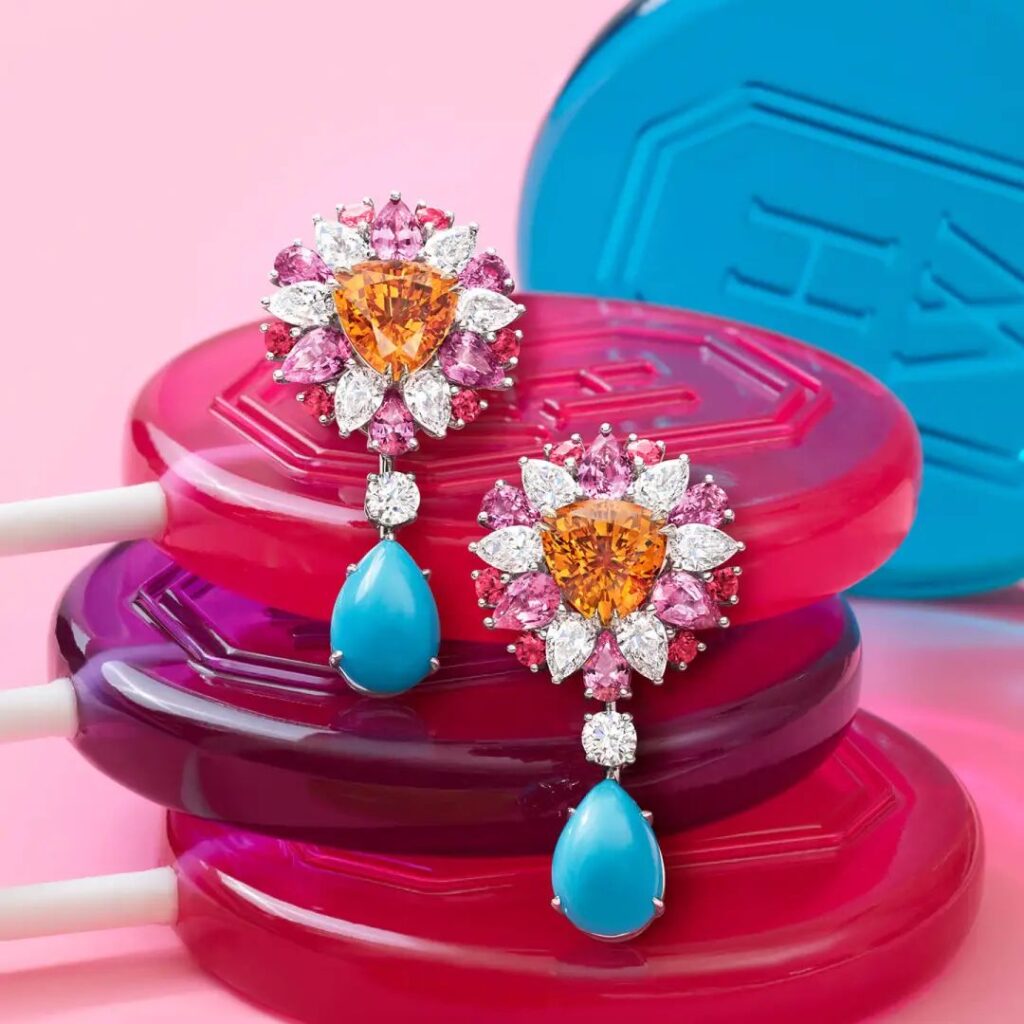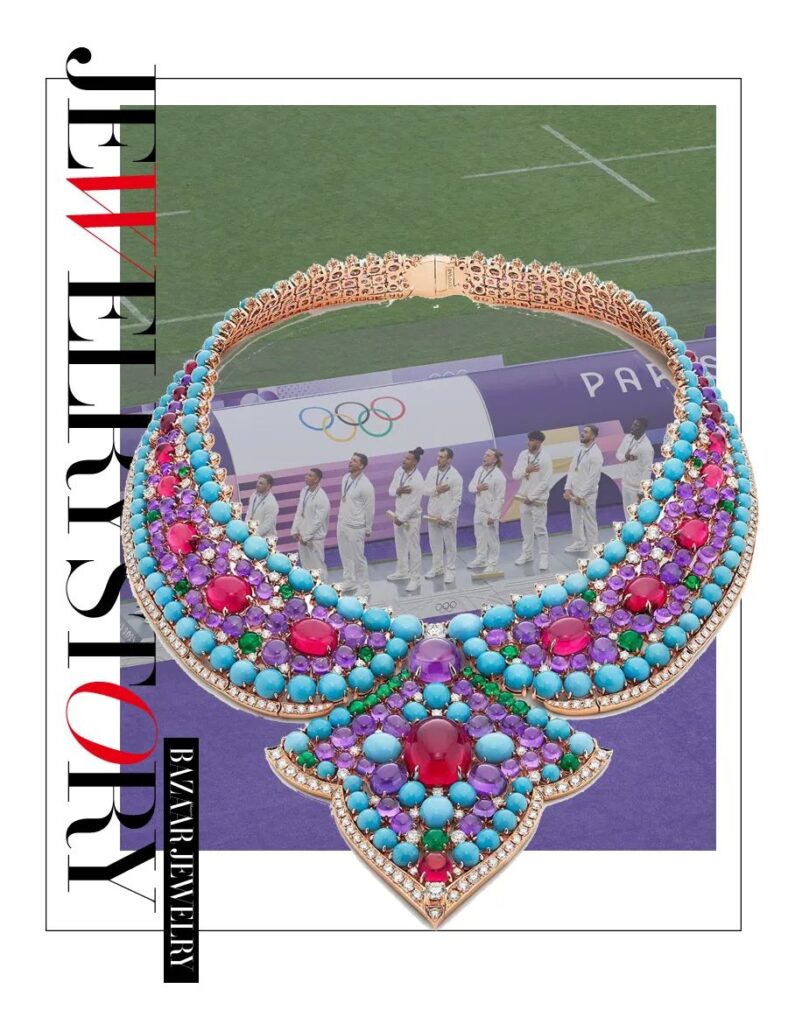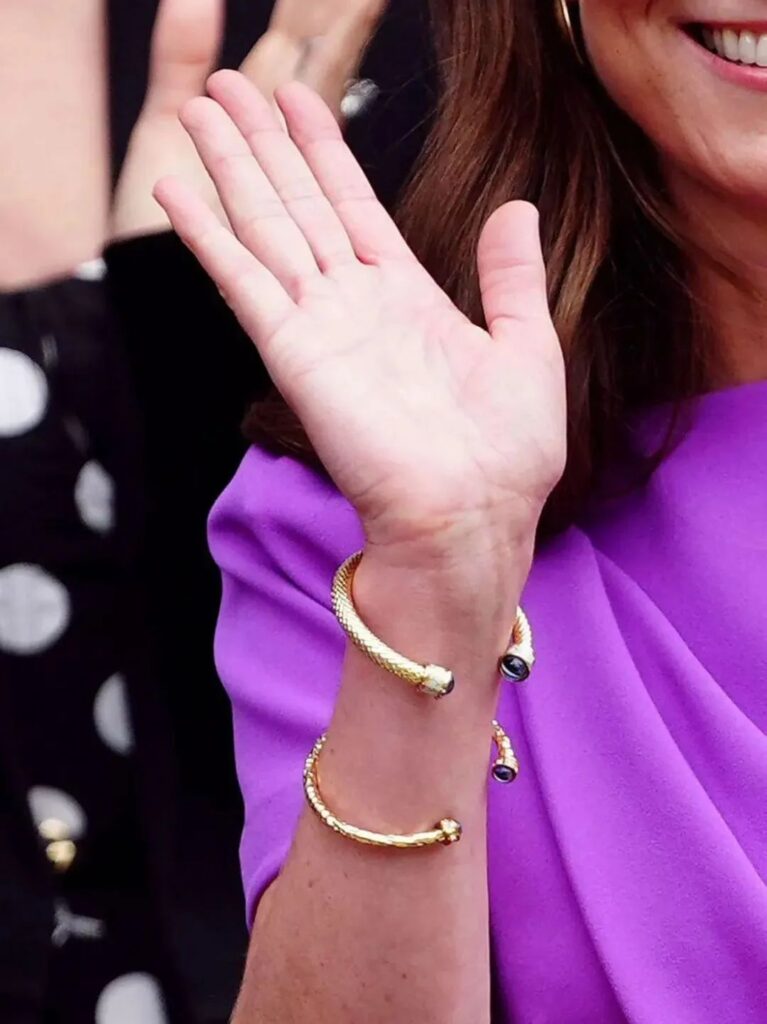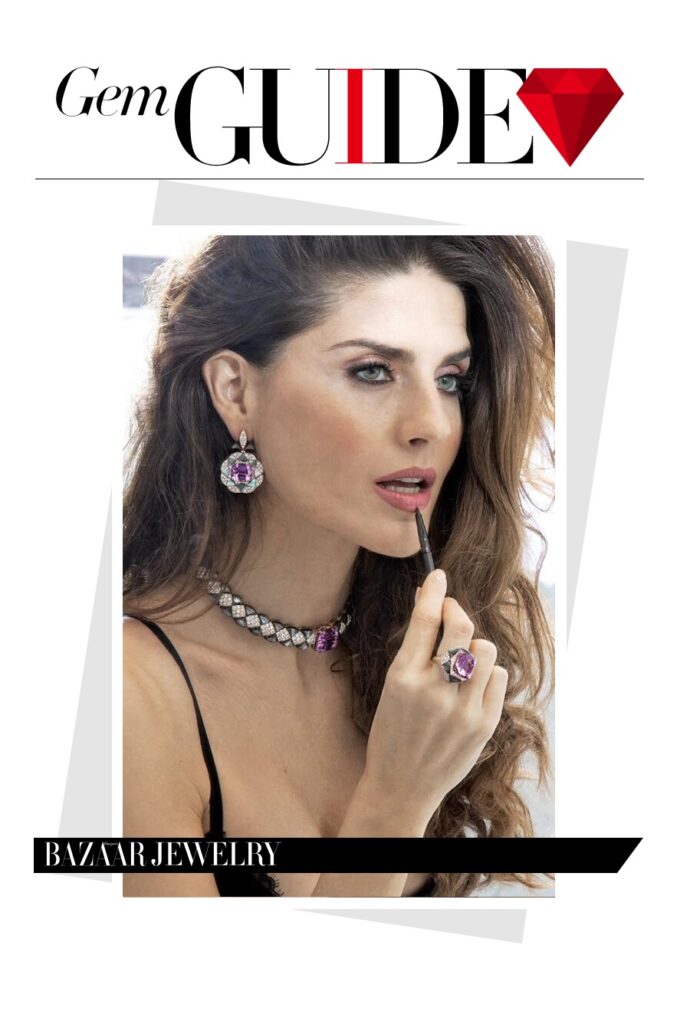
Mother-of-pearl often plays a supporting role in jewelry, serving as a backdrop or base material. It’s like a selfless supporting actor, providing the perfect “canvas” for jewelry designers to unleash their creativity. However, with exceptional craftsmanship and innovative ideas, it can also become the undisputed star, taking center stage in jewelry pieces. Today, we’ll introduce you to some “true techniques” that bring out the radiance of mother-of-pearl!
Mother-of-pearl, also known as nacre, is the iridescent substance found on the inner layer of many mollusk shells (such as mussels or sea snails). Mollusks secrete nacre to protect against irritants and abrasions that enter their shells. The nacre is distributed along the shell’s surface, forming a shimmering, rainbow-colored surface known as mother-of-pearl.
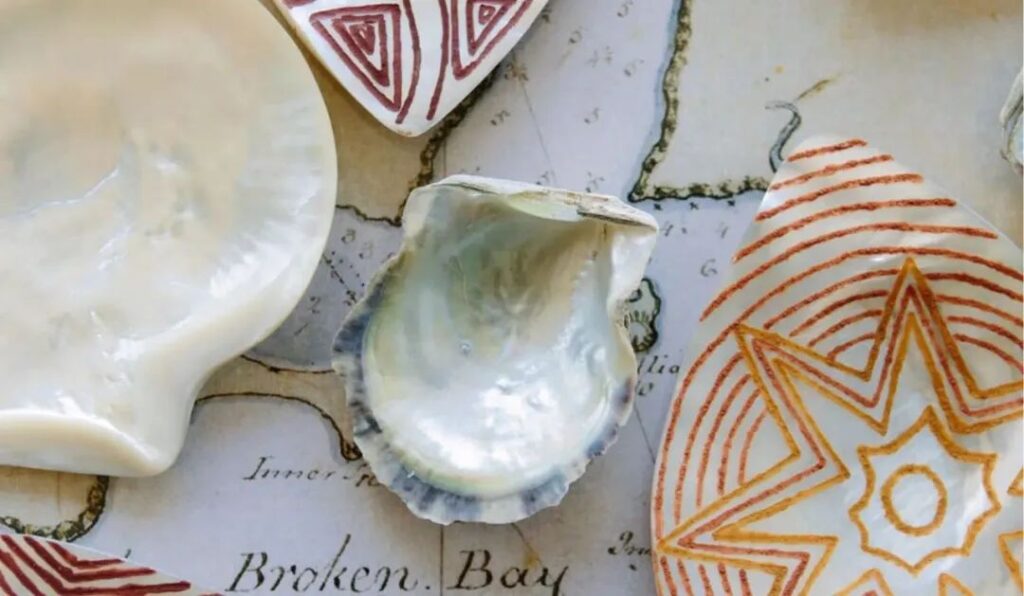
Interestingly, while only a small number of mollusks can produce pearls, most mollusks form mother-of-pearl. Like pearls, mother-of-pearl typically appears creamy white, white, or grayish-white.
However, depending on the species of mollusk, rare varieties can be gray, silver, yellow, black, blue-green, purple, and red. Due to the large surface area of nacre covering the shell, it has been an excellent material for carving and inlay decorations since ancient times.
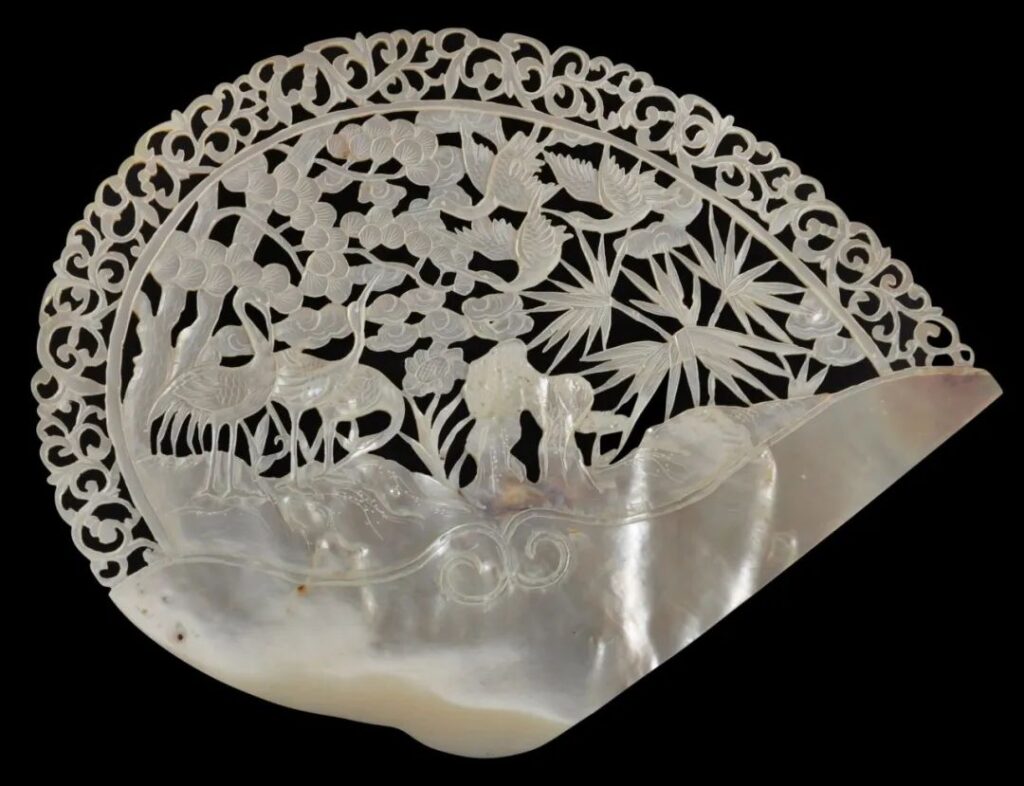
The use of mother-of-pearl in jewelry can be traced back to 4200 BC, with evidence found in ancient Egypt, Mesopotamia, India, and China. Because of its iridescent luster, it has been used in sacred religious decorations in both Eastern and Western cultures. Consequently, mother-of-pearl symbolizes good fortune and prosperity in many cultures.
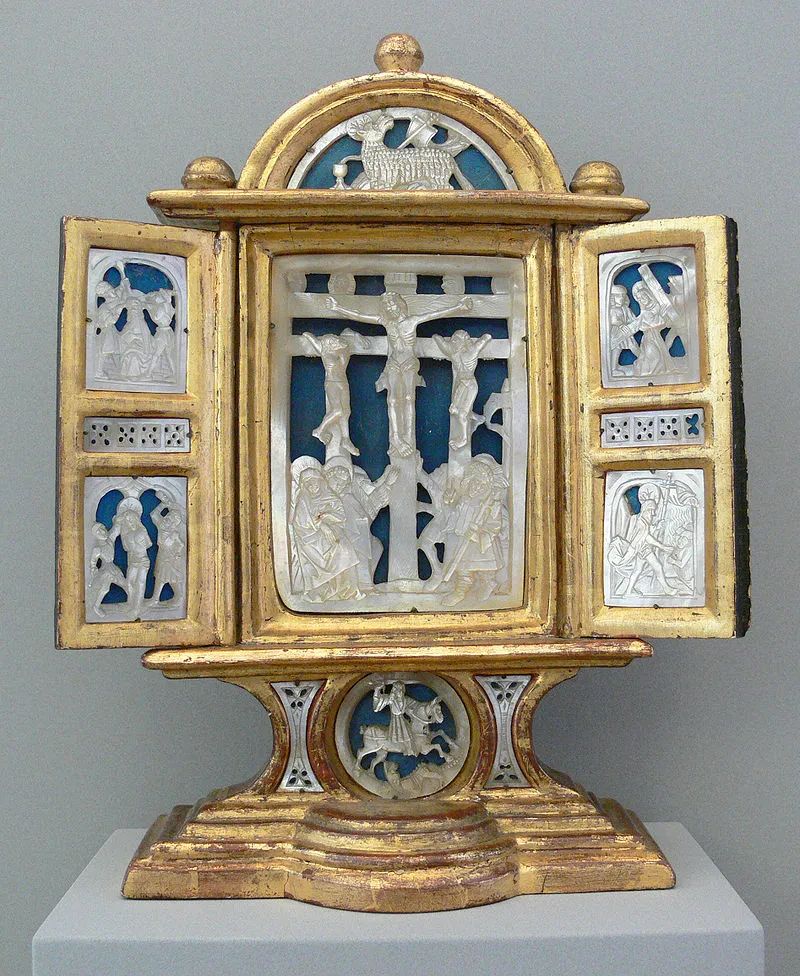
Mother-of-pearl is a lightweight yet durable material, as it evolved to protect mollusks. It’s also versatile, lending itself to various processing techniques from carving to inlaying and coating, showcasing rich decorative possibilities. As a result, it’s widely used in jewelry, clothing, watches, furniture, and even architecture.
China began using mother-of-pearl as early as the Shang and Zhou dynasties, developing the unique “luodian” inlay technique. Ancient artisans would grind shells into thin pieces depicting figures, flowers, birds, geometric patterns, or even characters, then inlay them on the surface of objects according to the desired design.
This craft reached its peak during the Ming and Qing dynasties, evolving into various techniques such as point inlay, colored background inlay, and hard inlay carving. Generally applied to lacquerware, it could also be used on jade or metal, creating magical and brilliant artistic effects under light.
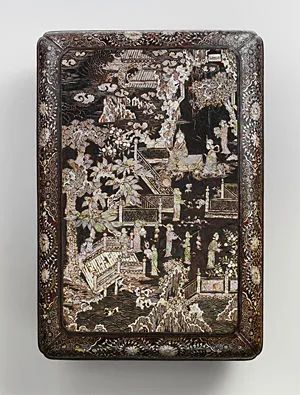
Black lacquer, mother-of-pearl.
Metropolitan Museum of Art, New York.
When this technique is combined with precious stones such as jade, ivory, colored stones, and coral, it’s known as “baibao qian” or “hundred treasures inlay.” This method is widely applied to jewelry pieces like pendants, hat ornaments, buttons, court beads, earrings, bracelets, ring faces, and pendant beads.
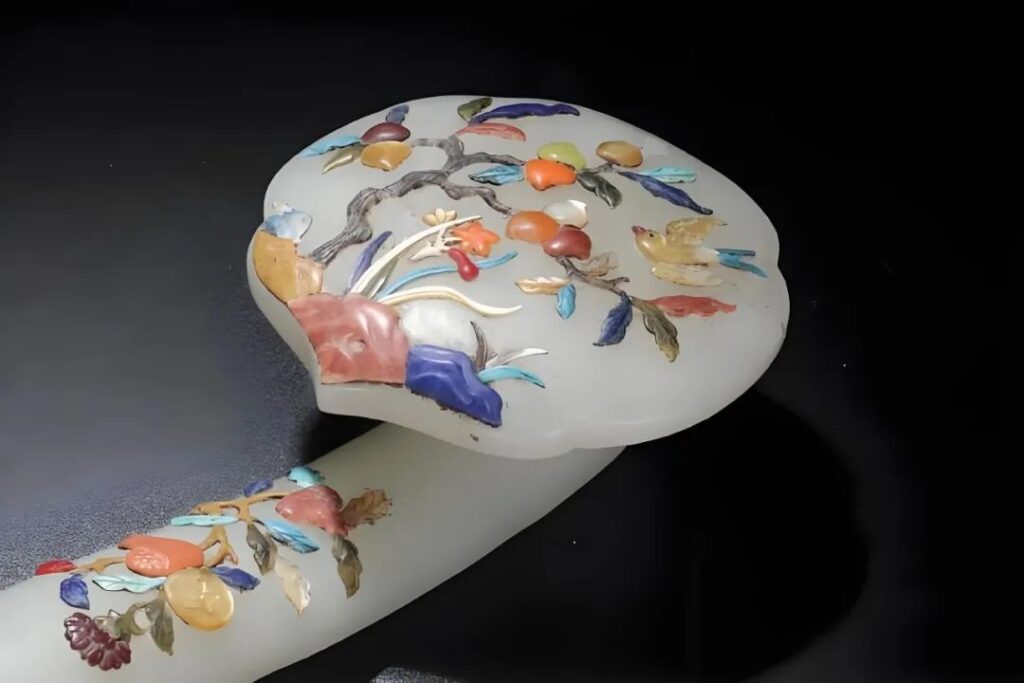
In modern times, many jewelry designers have given new life to the “luodian” inlay technique. For instance, Hong Kong designer Austy Lee has successfully developed it into a three-dimensional art form to showcase his pursuit of “psychedelic beauty.”
He says, “I like to incorporate a lot of mother-of-pearl in my works because it has an iridescent effect that creates illusions. Although it’s technically demanding, it’s very rewarding to cut and inlay them into a perfect picture.”
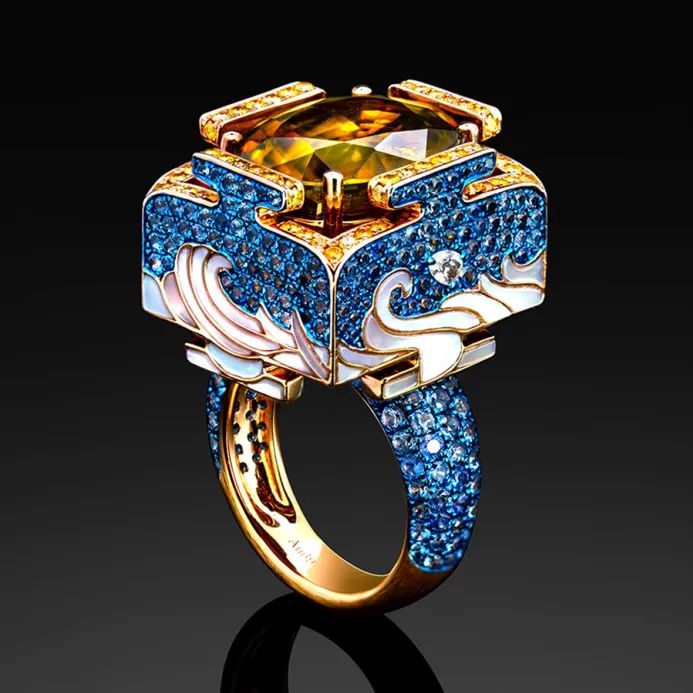
Set with Sri Lankan hessonite, sapphire, mother-of-pearl,
fancy yellow diamonds, and Sanctus-Cubus series diamonds.
He can inlay mother-of-pearl to create delicate koi fish scales or butterfly wings, showcasing nature’s vibrant side.
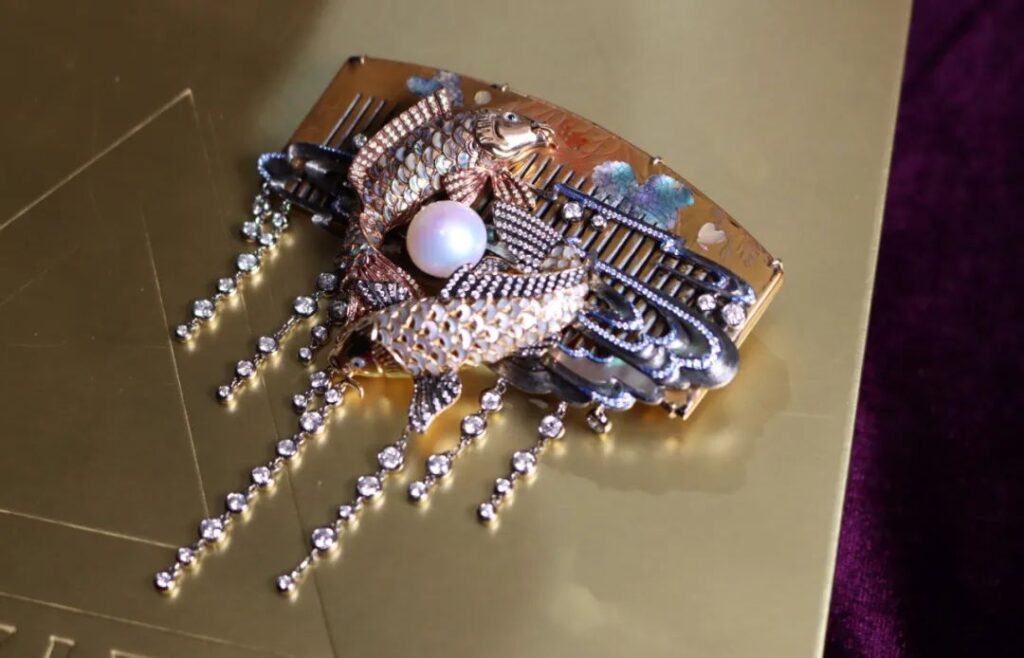
Ancient Fetus series
Sun and Moon brooch
Yellow gold, rose gold, antique lacquerware, pearls, mother-of-pearl, diamonds
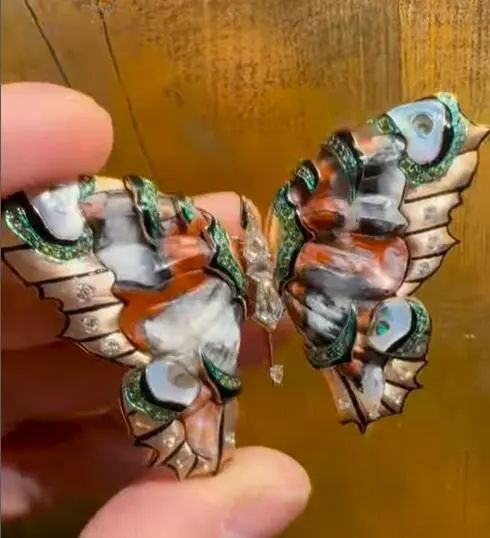
Aglais io brooch
18K rose gold, agate, diamonds, mother-of-pearl
He also uses mother-of-pearl as a foundation for color, combining it with color-changing opals and titanium to highlight that psychedelic allure. Alternatively, he pairs it with amethyst, using contrast to display a subtle Oriental charm.
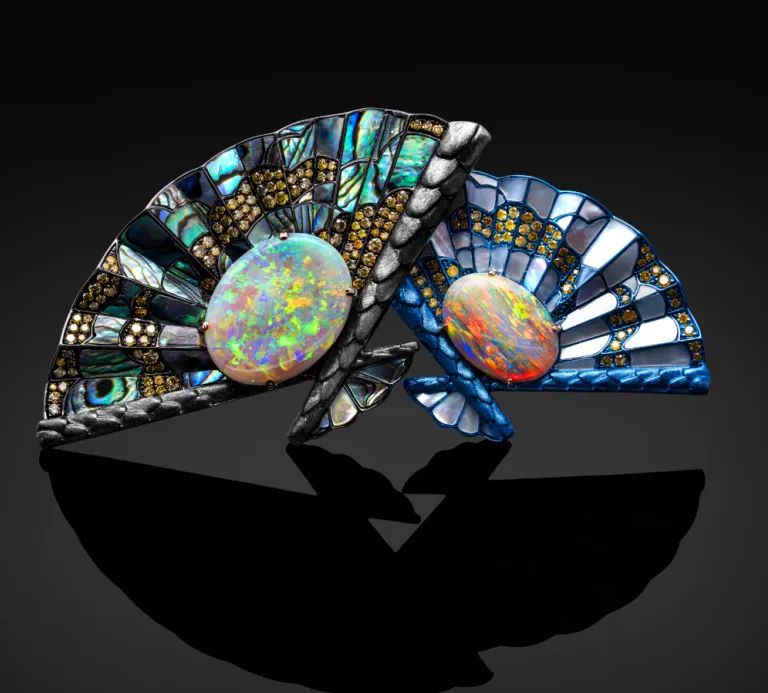
Rainbow Prism series
Hahatoko Akomeogi brooch
Rose gold, opal, mother-of-pearl, abalone shell, diamonds
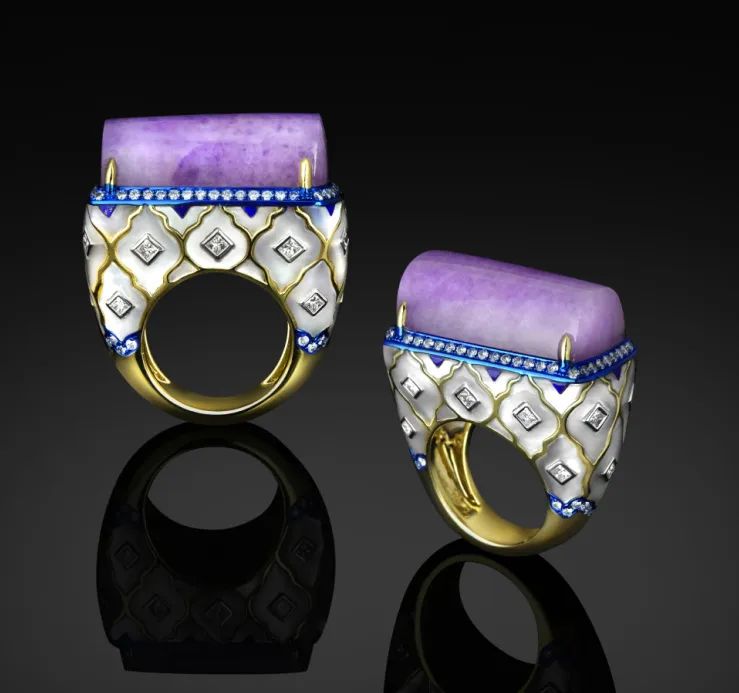
Iznik Silent series
Iznik ring
Rose gold, amethyst, lapis lazuli, mother-of-pearl, diamonds
He also utilizes the iridescent light effects of mother-of-pearl to create three-dimensional light and shadow variations. For example, he combines it with diamonds to create relief and intaglio effects, or with rubies and gold, using geometric lines and texture changes to display undulating transitions.
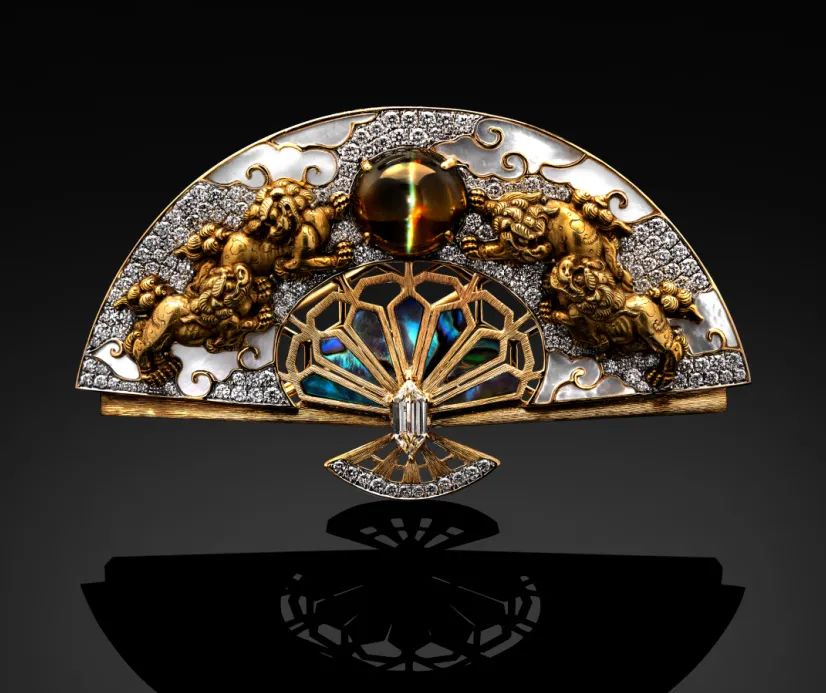
The 4Nghês & Sun Fan brooch
Yellow gold, chrysoberyl cat’s eye, antique Menuki
Mother-of-pearl, diamonds
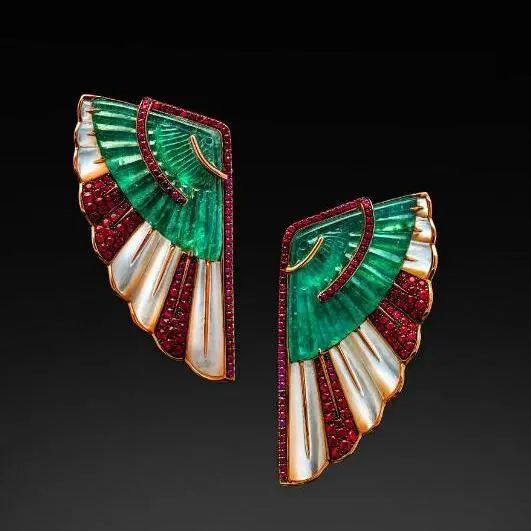
18K white gold, jade, mother-of-pearl, rubies
Chanel has also utilized the “luodian” inlay technique in jewelry creation. Inspired by Coco Chanel’s collection of Chinese ebony screens, they launched the Coromandel high jewelry series, using inlaid mother-of-pearl to paint on metal, perfectly recreating the Chinese painting aesthetics from the screens.
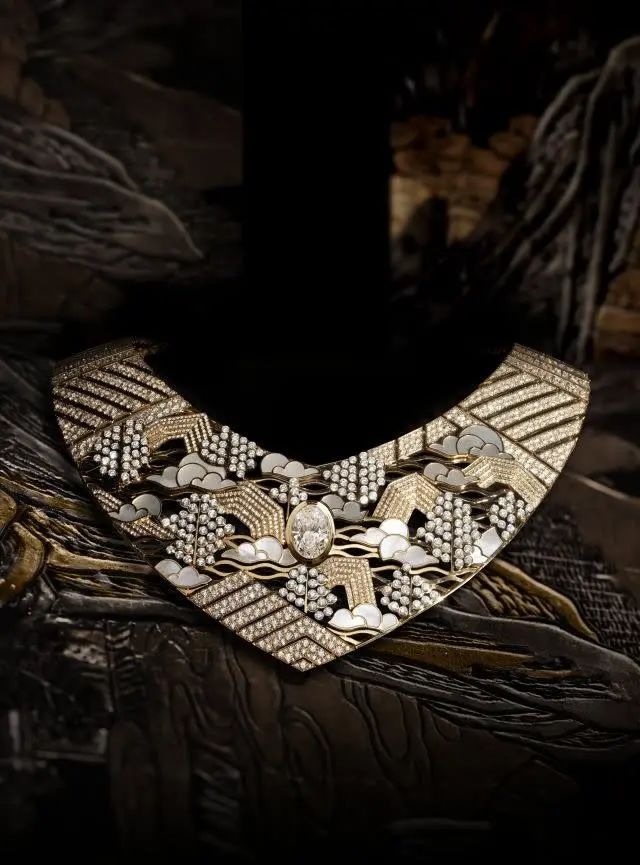
Coromandel high jewelry series
Horizon Lointain necklace
Yellow gold, platinum, diamonds, mother-of-pearl
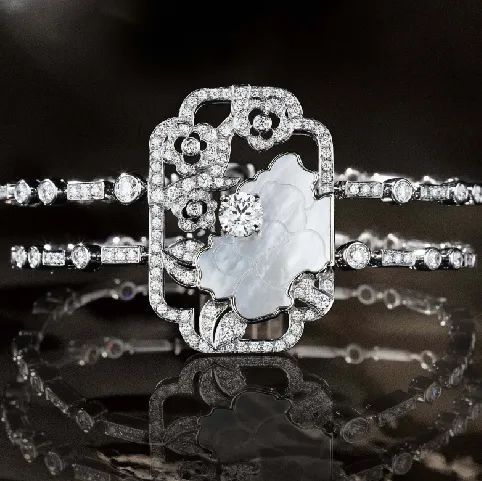
Coromandel high jewelry series
Fleur de Nacre bracelet
White gold, diamonds, mother-of-pearl
Dior takes the opposite approach. In the 2023 “Fashion Garden” high jewelry collection, artistic director Victoire de Castellane inlaid mother-of-pearl on lacquerware as a “canvas,” setting various colored gemstones on top. This showcases a new “hundred treasures inlay” technique, displaying playfulness and modernity with bright colors.
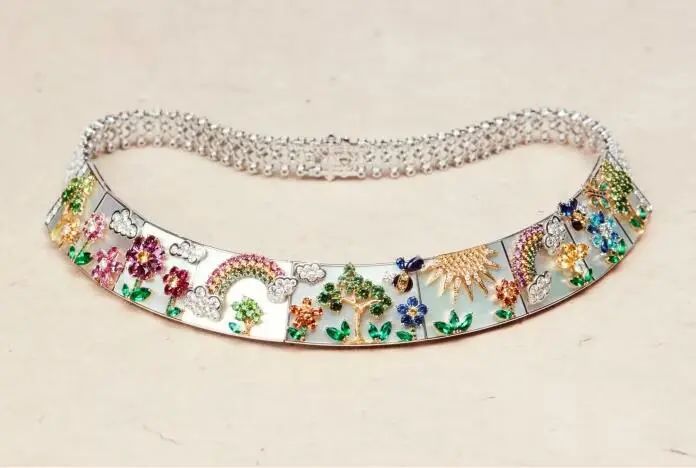
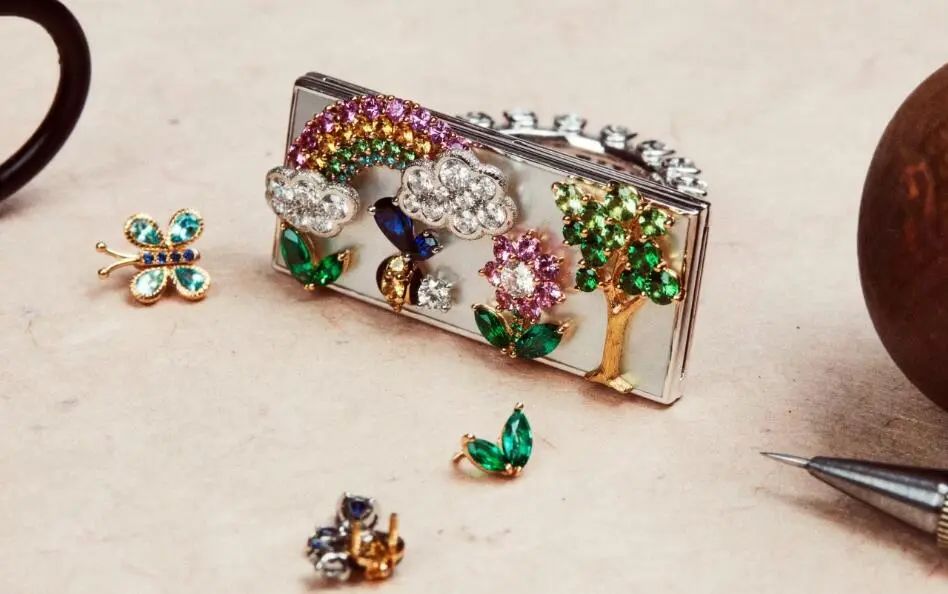
Les Jardins de la Couture high jewelry series
Mini Milly Jardin necklace
Diamonds, emeralds, sapphires, tsavorites, spessartite garnets,
demantoid garnets, Paraiba tourmalines, rubies, mother-of-pearl, lacquer
Some designers incorporate mother-of-pearl into more modern jewelry designs. They carefully custom-cut mother-of-pearl into special shapes. This requires highly skilled craftsmen to cut mother-of-pearl of the same thickness and color into identical shapes, then hand-polish them. Like a puzzle, these pieces are then seamlessly inlaid to form a flat surface, becoming the “base” of the jewelry.
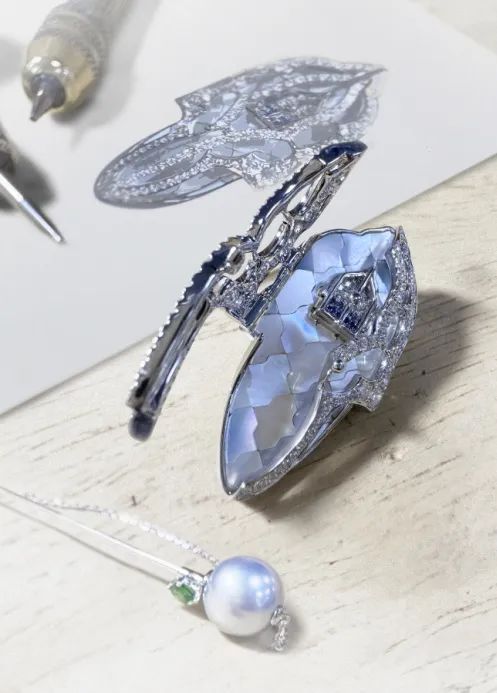
White gold, enamel, tsavorites, pearls, sapphires,
Mother-of-pearl, diamonds
The advantage of this technique is that it allows for large-scale use of mother-of-pearl, which can be pieced together into any shape. Due to the layering of elements, it doesn’t appear overly complex or figurative but rather has a geometric, minimalist style.
For example, Singapore jewelry designer Simone Ng, though inspired by an antique Chinese mother-of-pearl inlaid wooden table, distilled from it a clean, modern beauty.
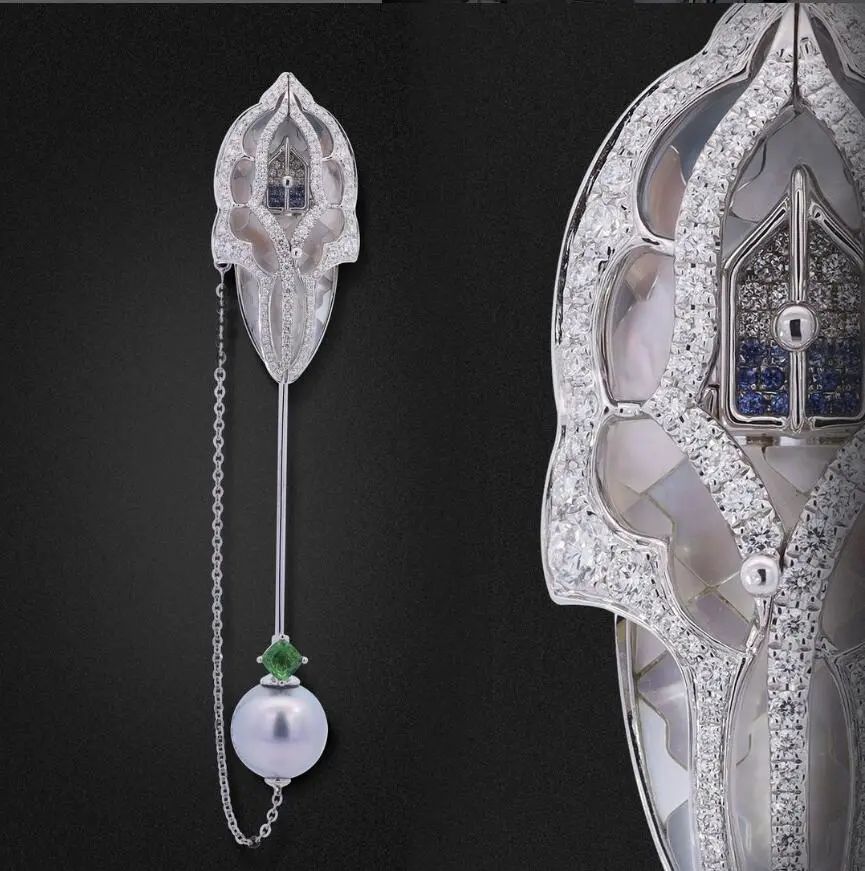
White gold, enamel, tsavorites, pearls, sapphires,
Mother-of-pearl, diamonds
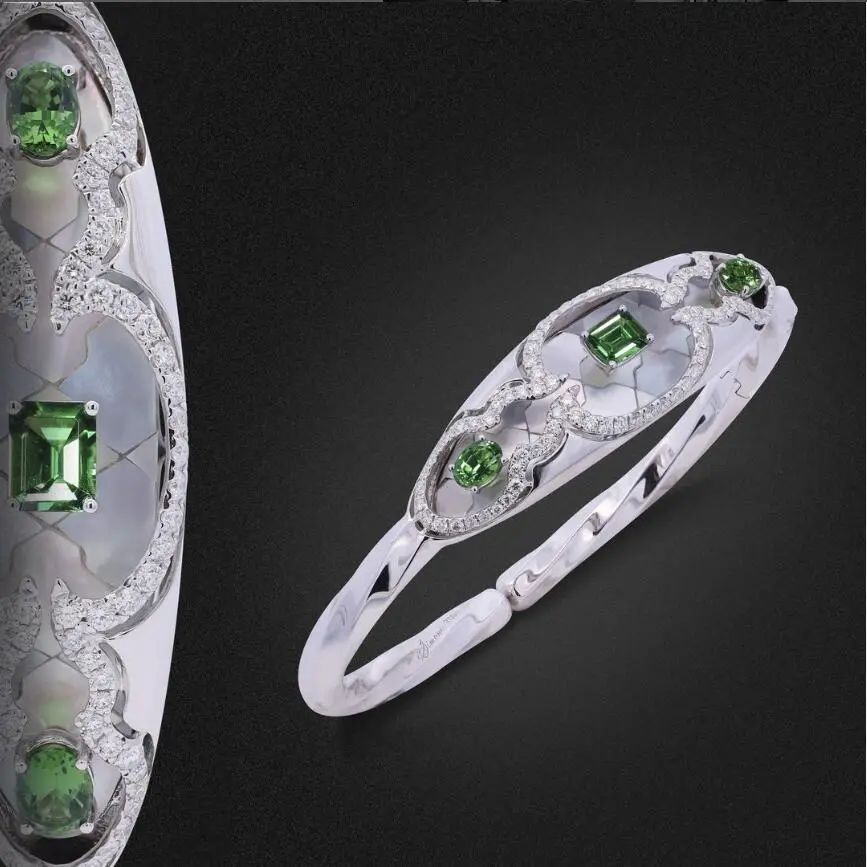
White gold, mother-of-pearl, tsavorites
She uses mother-of-pearl as the foundation of her jewelry, with its smooth, iridescent, and regularly patterned inlay serving as an excellent stage for the main stones, contrasting their pure, clean colors.
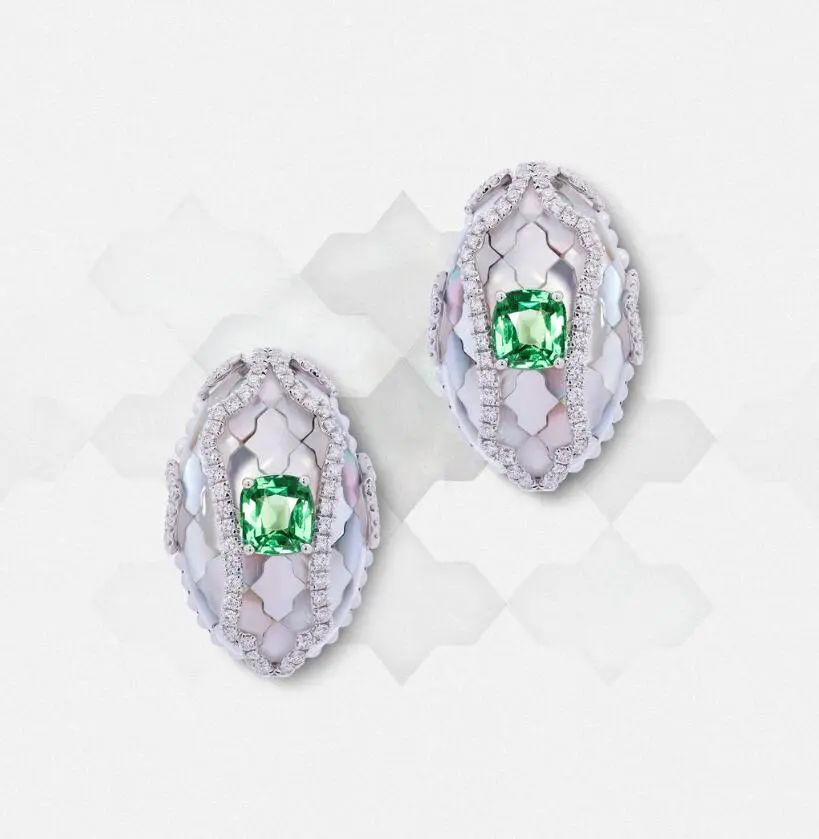
White gold, mother-of-pearl, tsavorites
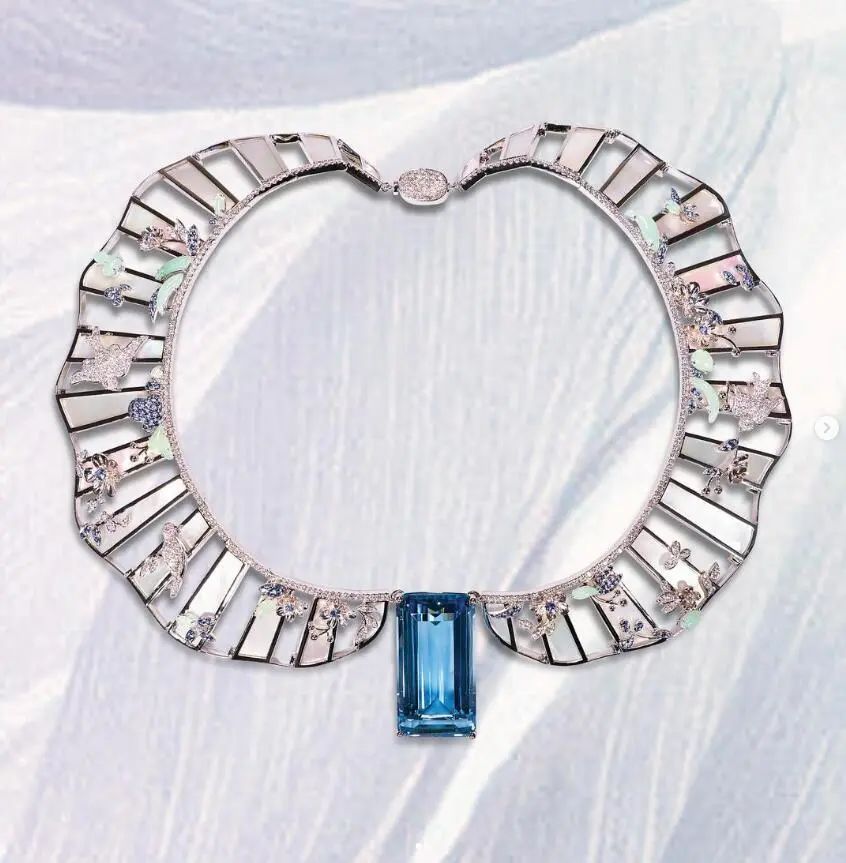
Le Grand Chinoiserie necklace
White gold, opal, aquamarine, mother-of-pearl, sapphires, diamonds
Roman high jewelry brand Maison J’Or also extensively uses this mother-of-pearl cutting technique in their designs. When founders Attilio and Barbara Gelpi established the brand 20 years ago, they decided to make mother-of-pearl a key factor in their designs.
Barbara Gelpi says, “Each of our pieces features mother-of-pearl as a surface, because this material has a rich variety of tones. This alluring natural iridescence is a gift from nature that we must not squander.”
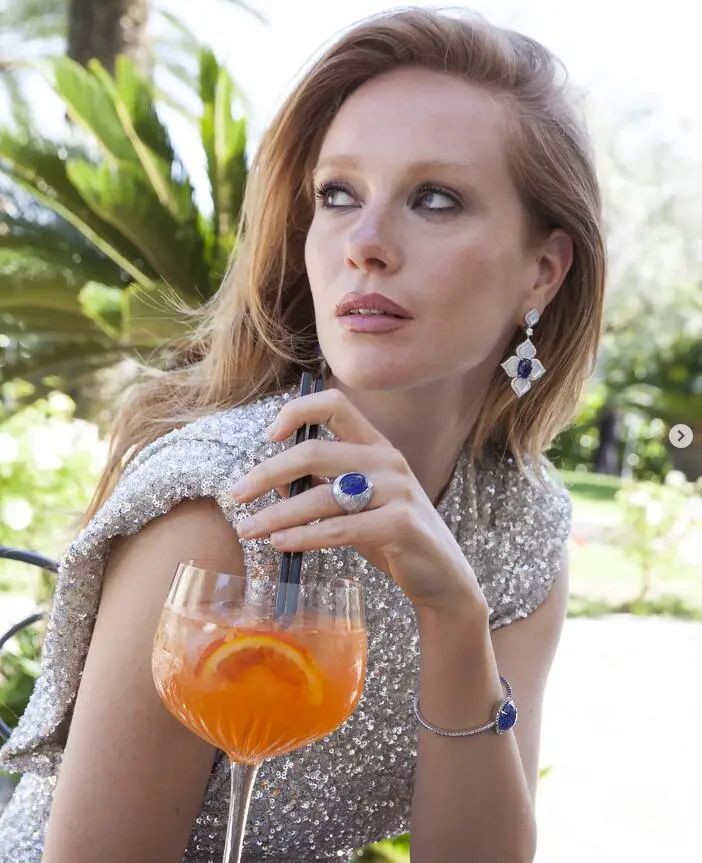
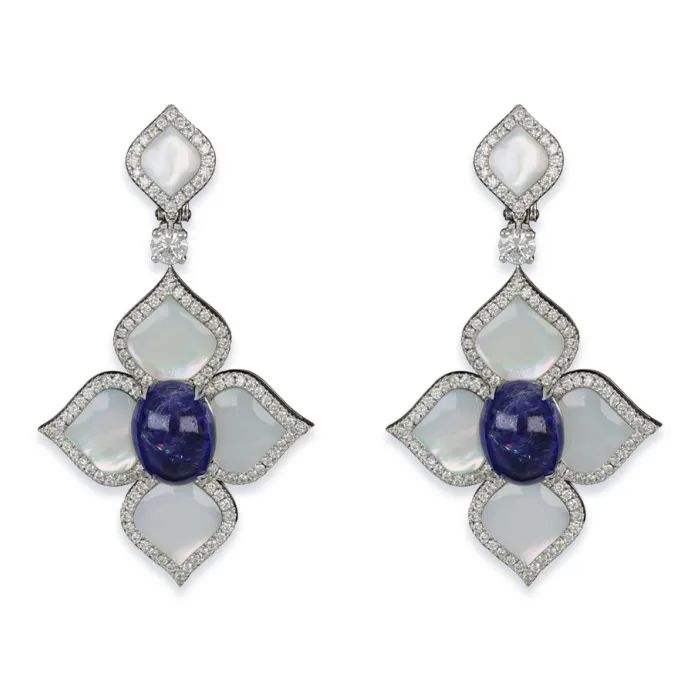
18K white gold, tanzanite, diamonds, mother-of-pearl
They prefer cutting mother-of-pearl into curved shapes to better showcase its unique iridescence and luster, combining it with metal and pavé-set diamonds to create richly varied textural effects.
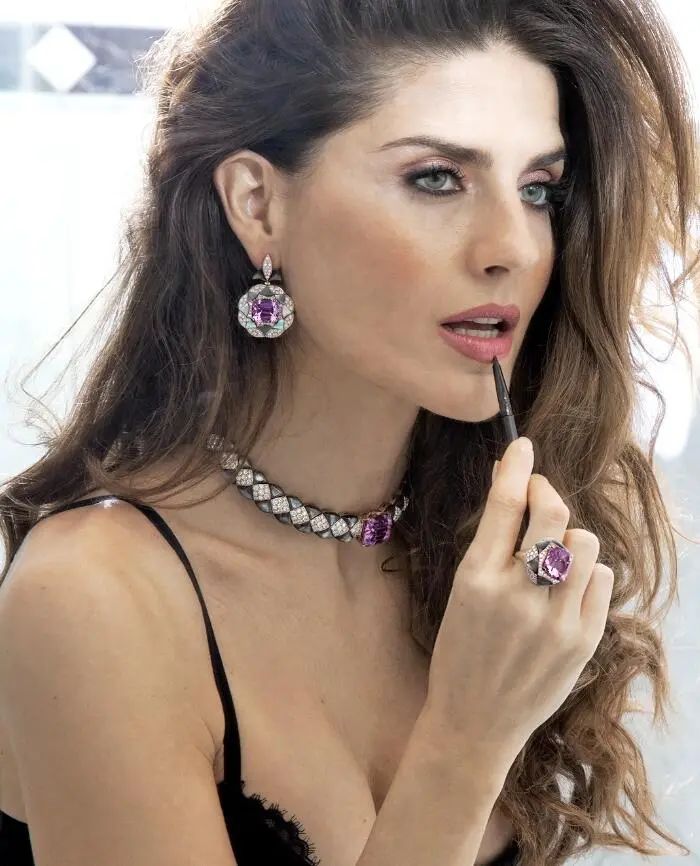
18K white gold, kunzite, diamonds, grey mother-of-pearl
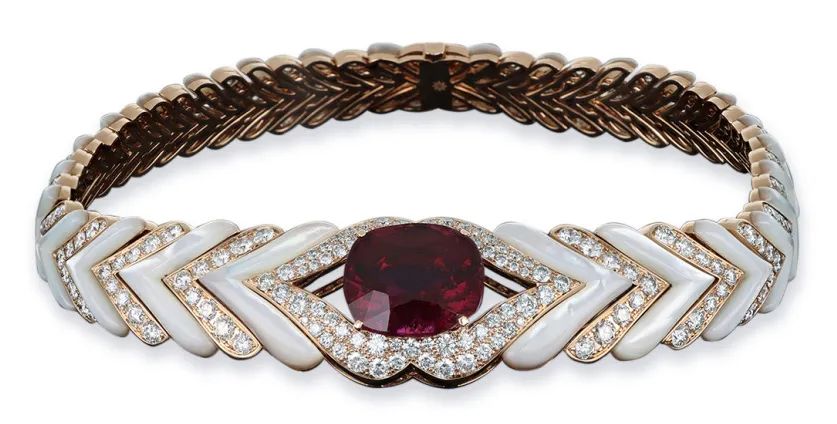
18K rose gold, mother-of-pearl, diamonds, tourmaline
The mother-of-pearl technique commonly used in the jewelry industry is actually carving. The mother-of-pearl jewelry seen from major brands typically employs this technique. Designers usually first outline patterns on the pearl layer surface, ensuring the design complements the shape of the mother-of-pearl.
Then, using carving tools like chisels, drill bits, and saws, they shape the material, removing thin layers from the surface to form shallow grooves and lines according to the desired design. After completion, the surface is ground and polished to enhance its shine and brilliance.
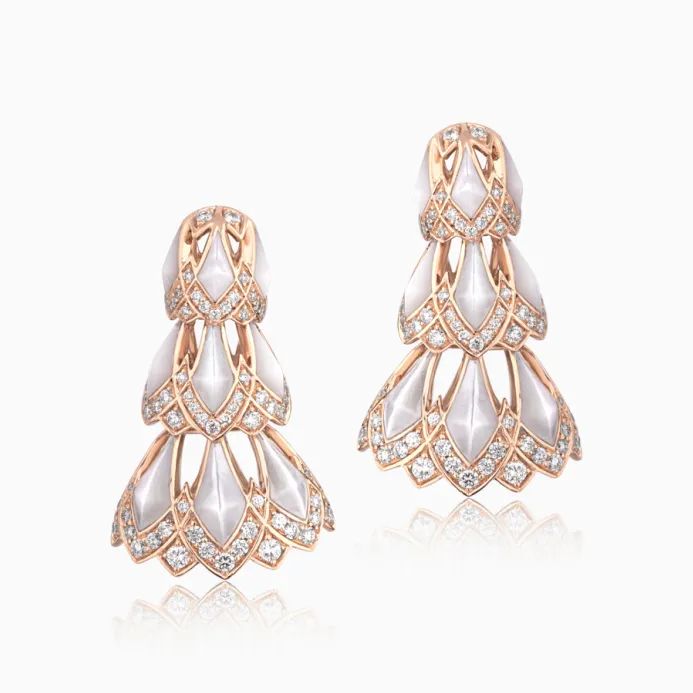
Rose gold, mother-of-pearl, diamonds
However, some designers take an unconventional approach. A pioneer in turning carved mother-of-pearl into miniature sculptural creations is Melanie Georgacopoulos, who specializes in pearls. Perhaps due to her background in sculpture, she always incorporates the abstract, linear, and powerful beauty pursued in sculptural art into her jewelry creations.
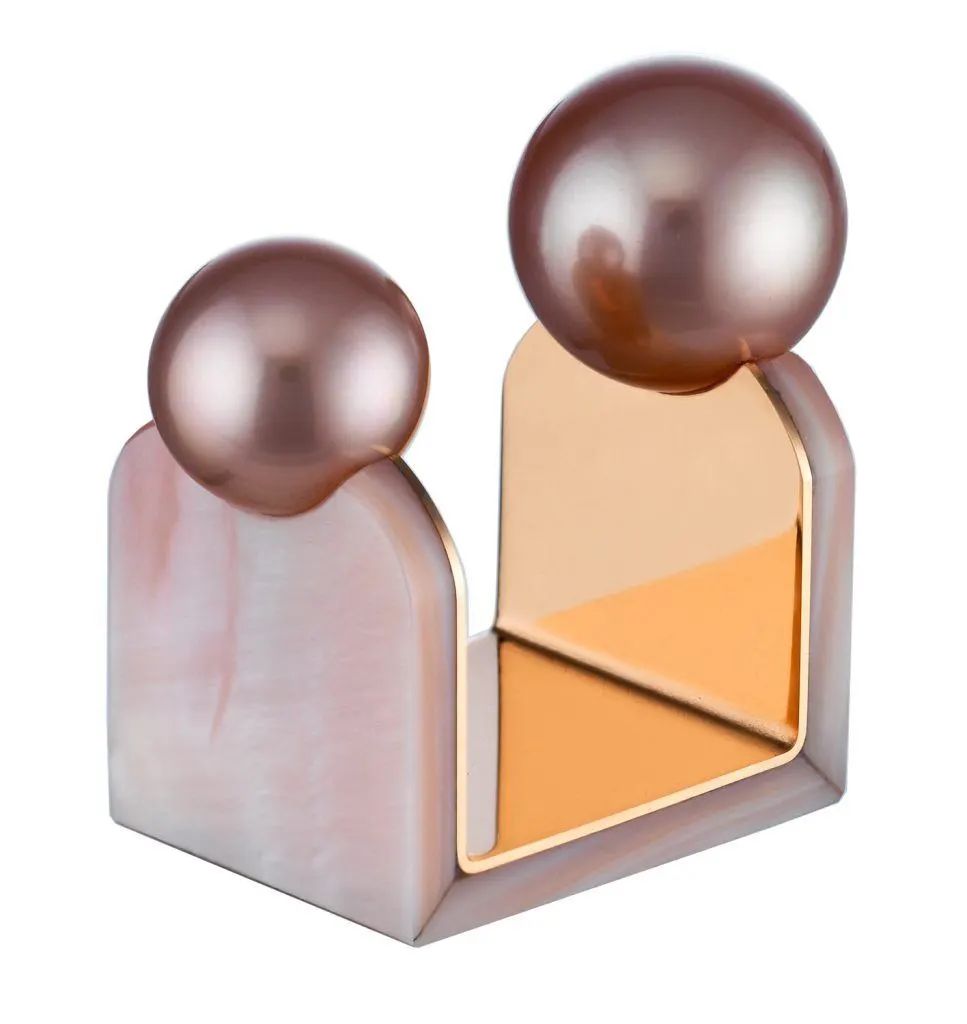
Mother-of-pearl, pearl
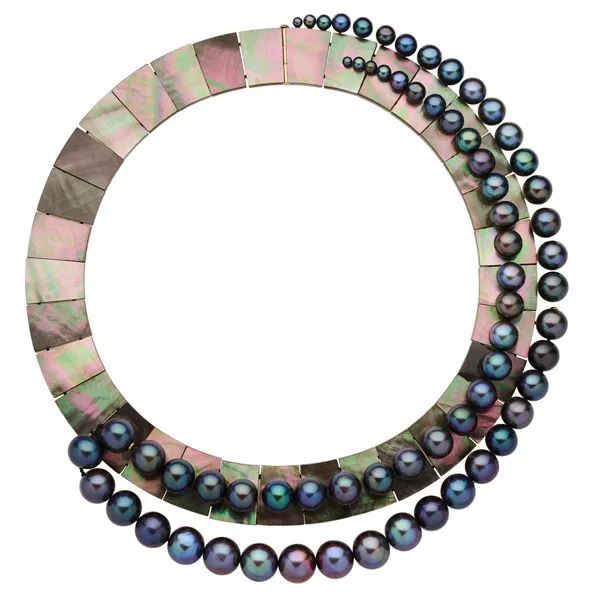
Mother-of-pearl, pearl
Melanie began exploring pearl craftsmanship while pursuing her master’s degree at the Royal College of Art in London in 2007. She quickly rose to fame in the jewelry world and started a long-term collaboration with Tasaki in 2013, having the opportunity to create revolutionary pearl designs.
Now, she has turned her attention to mother-of-pearl. She says, “In 2020, I developed a technique that I call ’embedding,’ where I push gemstones or pearls into mother-of-pearl. Through carving, they become one entity, presenting a completely new appearance.”
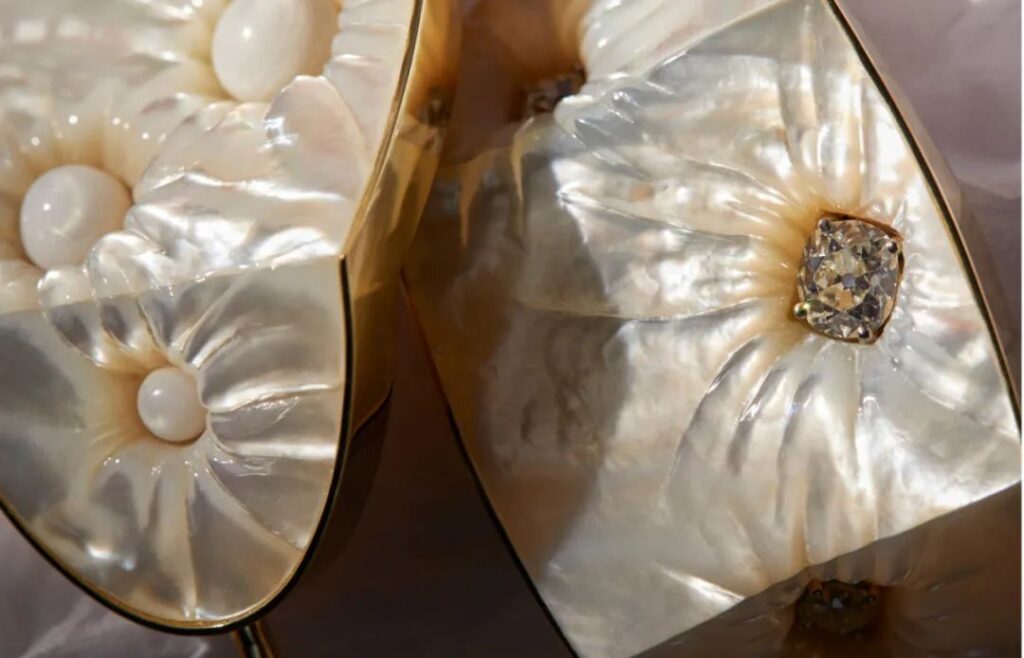
Developed “embedding” technique
She carves mother-of-pearl to create a soft, cushion-like feeling that embraces pearls and gemstones from all angles. Melanie Georgacopoulos says, “Creating this pillow-like texture was a challenge.
I spent several years developing this special carving technique because I felt that visually recombining pearls with their original ‘home’ – the oyster – creates a unique poetic quality. It evokes associations of warmth and nurturing.”
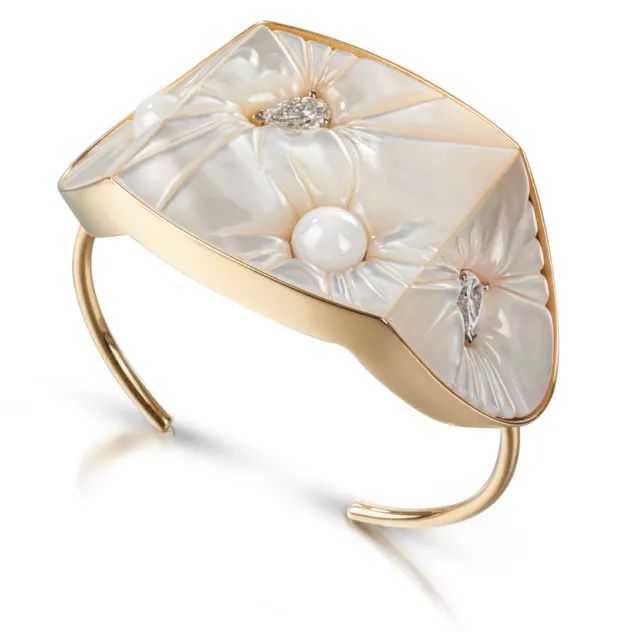
Pearl, diamonds, mother-of-pearl
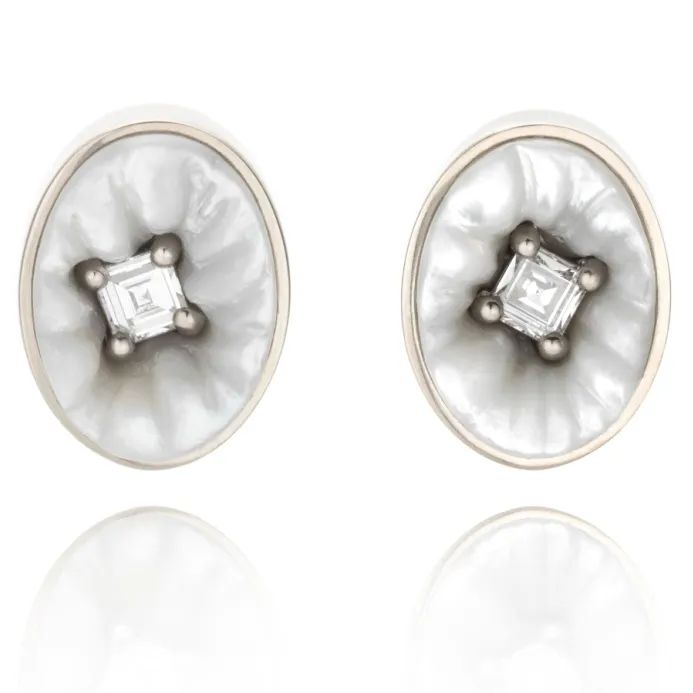
White gold, mother-of-pearl, diamonds
Indeed, Melanie Georgacopoulos is particularly fond of combining pearls and mother-of-pearl. However, before inventing the “embedding” technique, she preferred patchwork. While others sought mother-of-pearl with uniform tones and luster, she uniquely loved piecing together mother-of-pearl of different colors and varieties.
This created a three-dimensional light and shadow effect, constructing a visual illusion of depth on a flat surface, showcasing a minimalist architectural beauty.
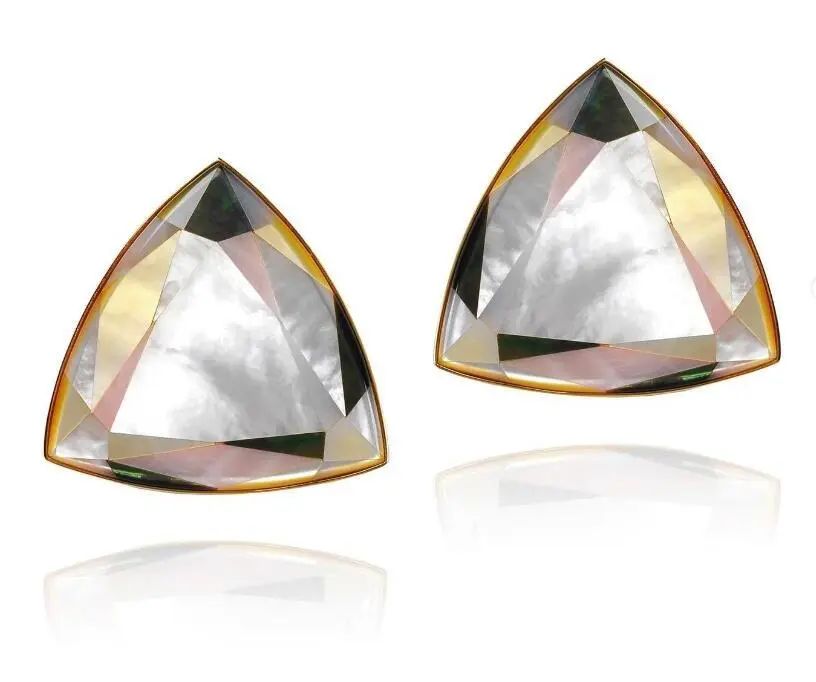
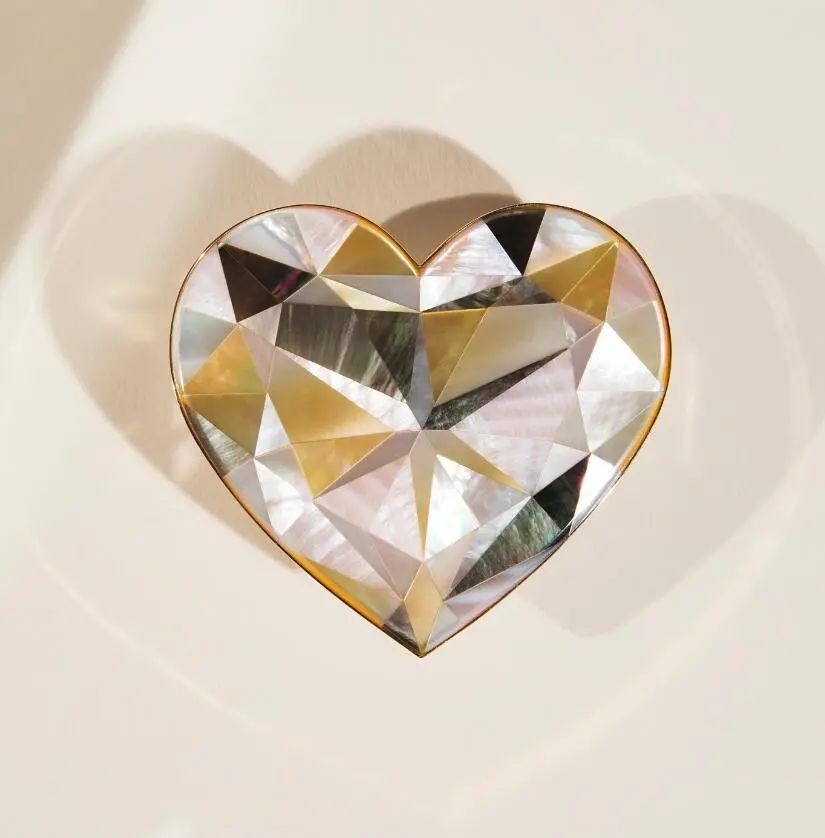
Her signature piece is a “tile” bracelet, where she combined pink, peacock, and white mother-of-pearl, inlaid with a baroque South Sea pearl.
The regular geometric lines contrast with the irregular baroque shape, while different shades of mother-of-pearl are unified by consistent geometric shapes, creating a rich visual effect that is both contradictory and harmonious.
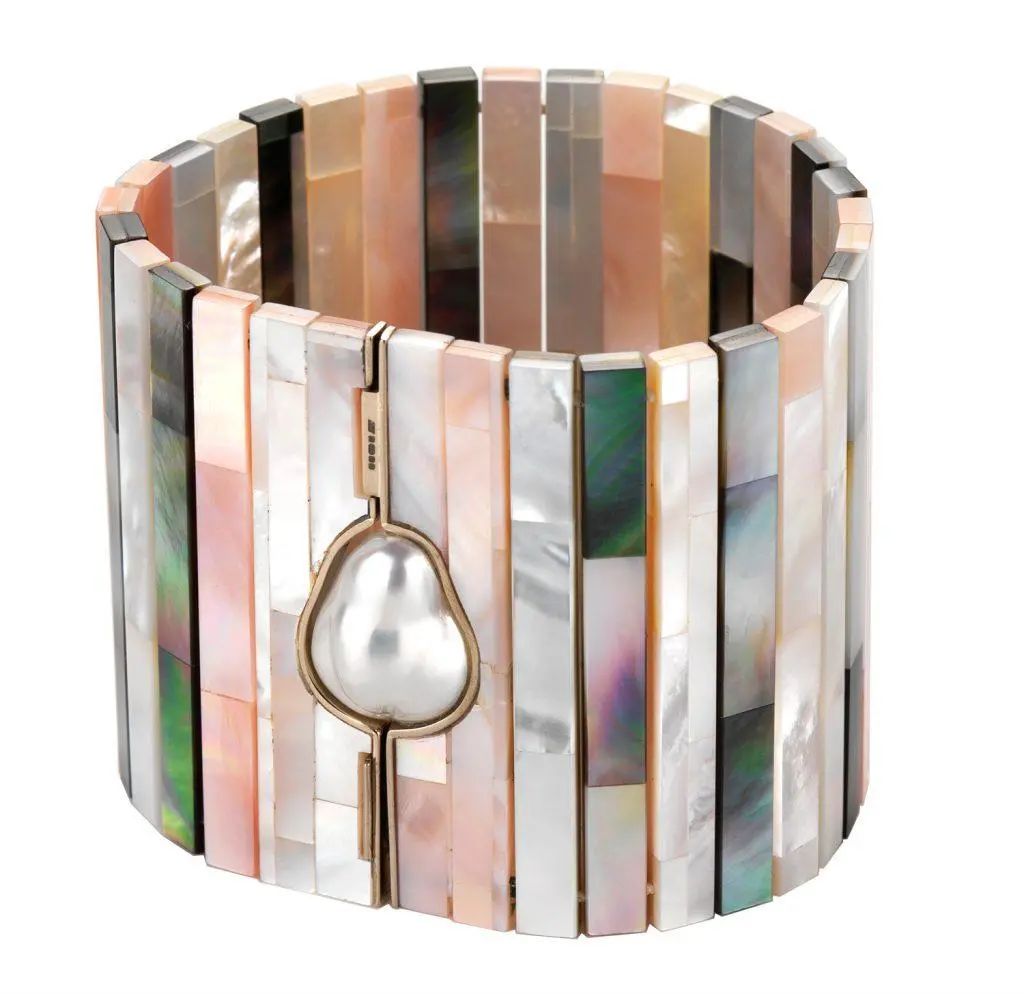
Mother-of-pearl, pearl
Sharing a similar approach with Melanie Georgacopoulos is Assael, a brand specializing in pearls. They also enjoy combining mother-of-pearl with pearls, pursuing a “mix and match” that returns to the origin. Creative Director Peggy Grosz combines various pearls with the mother-of-pearl that nurtured them, conveying a harmonious beauty of life.
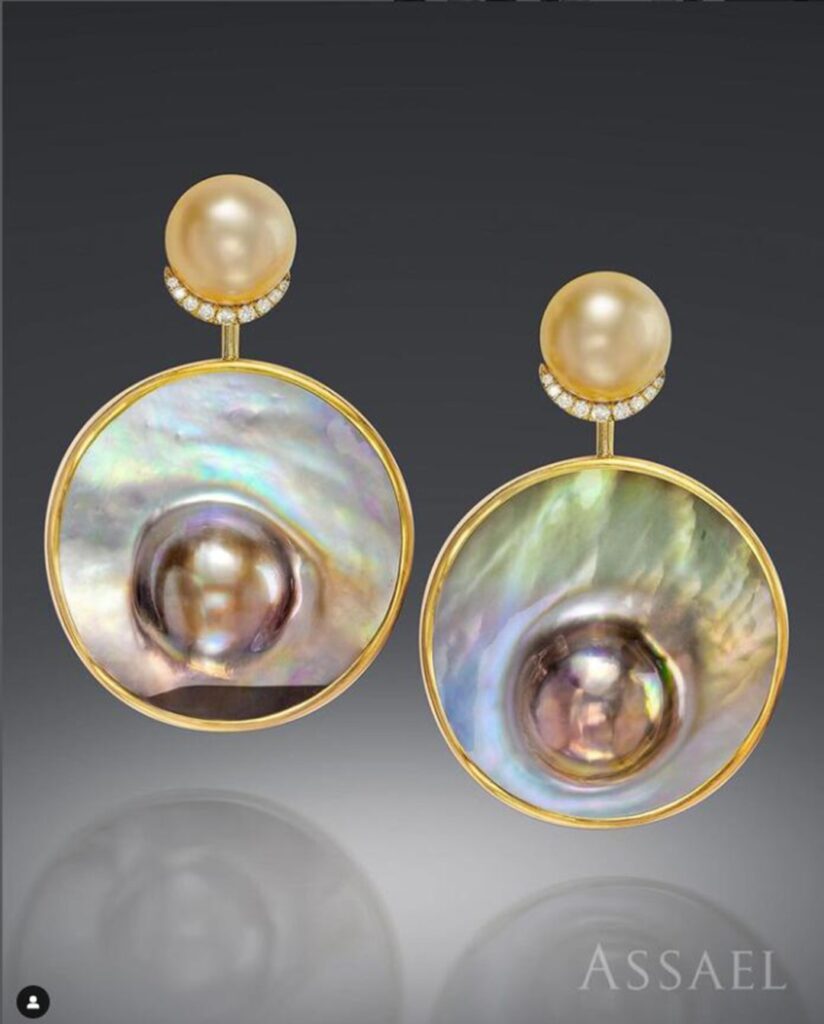
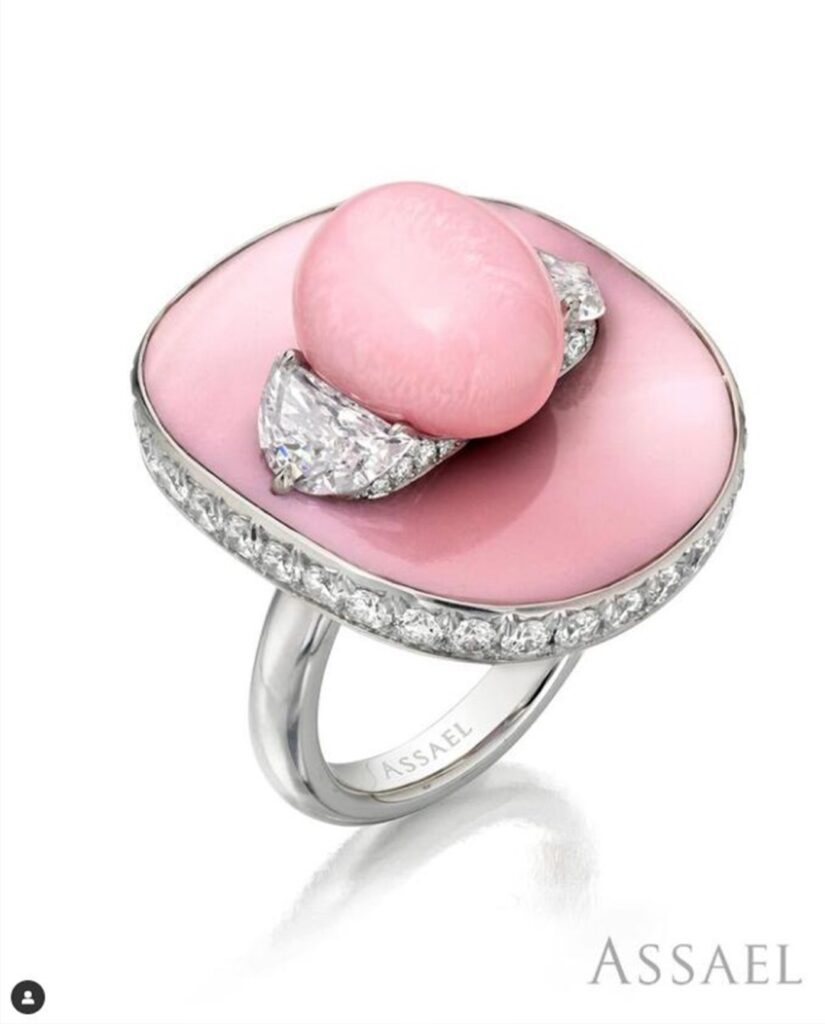
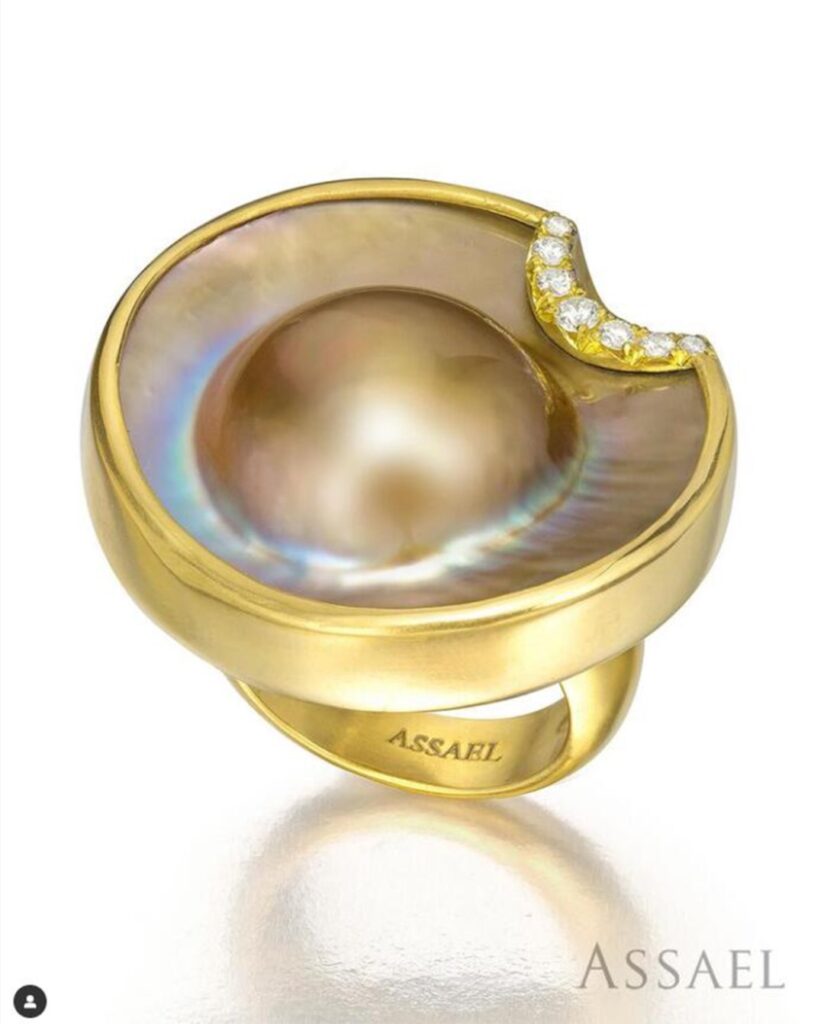
Some designers choose to mix various materials with mother-of-pearl. For instance, Boghossian, known for its inlay technique, typically an expert in layering gemstones, has created an entire bracelet using mother-of-pearl, then outlined patterns on it with diamond inlays.
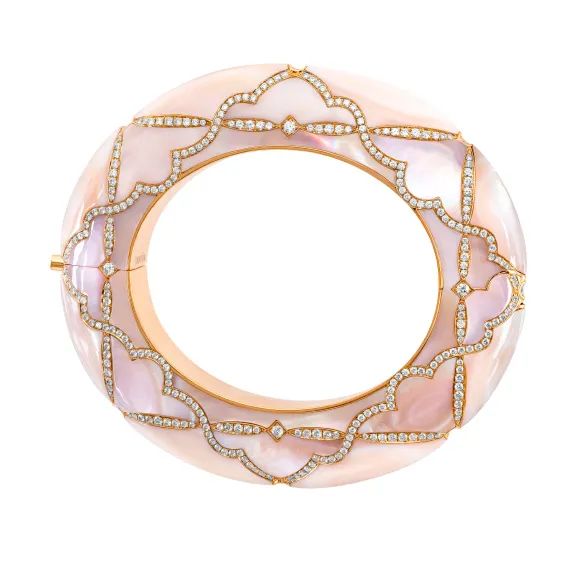
Mother-of-pearl, diamonds
Lydia Courteille, renowned for fantastical colors, used antique portrait-carved agates for earrings, deliberately choosing mother-of-pearl of matching tones to enhance the luster, perfectly creating an artistic atmosphere.
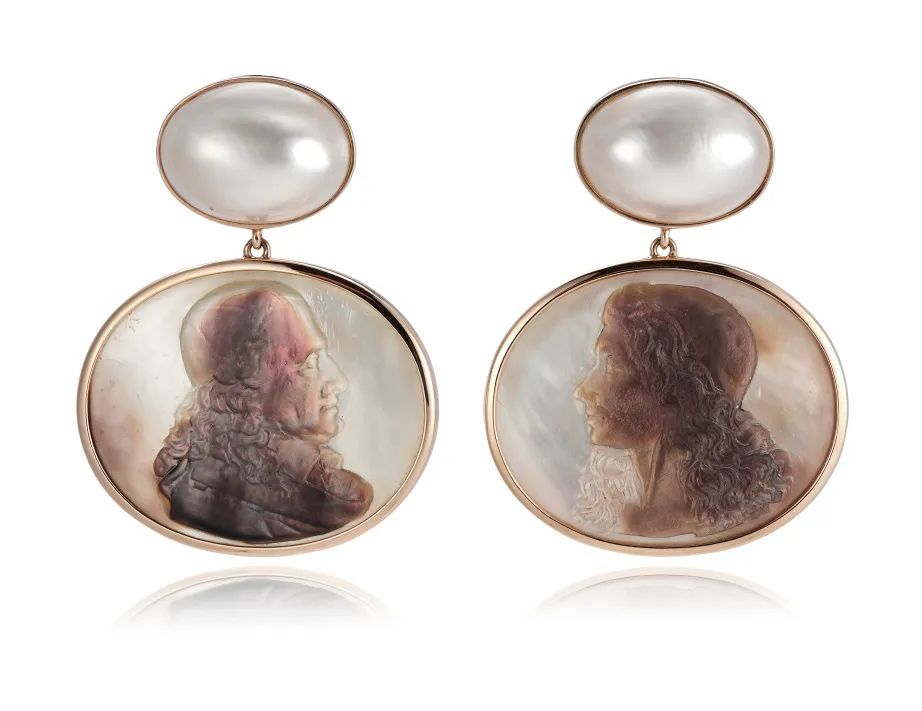
Antique carved agate, mother-of-pearl
Milamore combines mother-of-pearl of different colors with ancient textured gold, creating a three-dimensional effect on a flat surface.
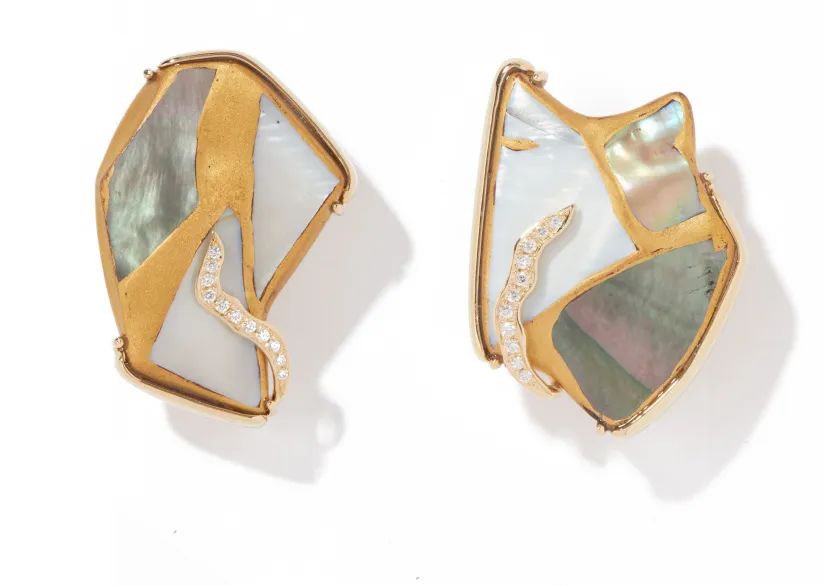
Mason and Books focuses on the interplay between gemstones, using mother-of-pearl with textured pattern effects to complement the brilliant facets of morganite.
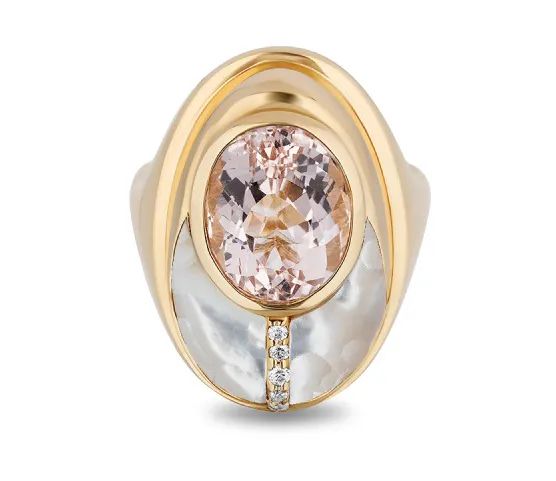
Mother-of-pearl, morganite
Another brand that must be mentioned for its love of mother-of-pearl is Boucheron, a pioneer in material mixing in the high jewelry circle. Creative Director Claire Choisne always brings various ingenious ideas, and mother-of-pearl with its iridescent halo is one of her favorite materials. Whether figurative or abstract, she can use it to freely express new creativity.
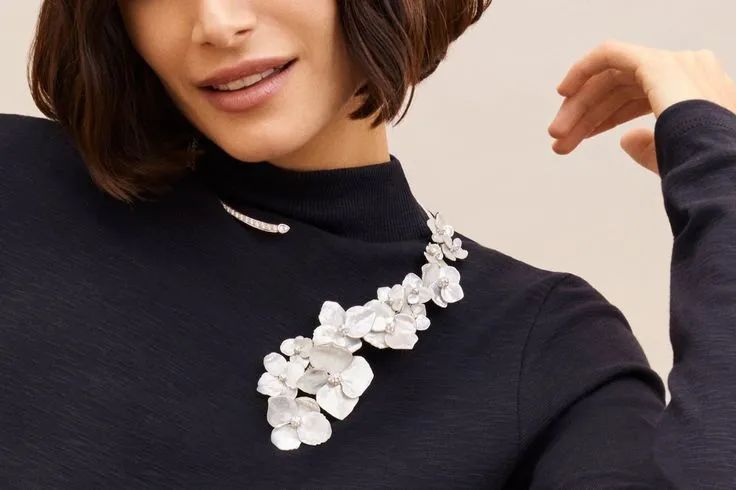
Nuage de Fleurs question mark necklace
Mother-of-pearl, diamonds
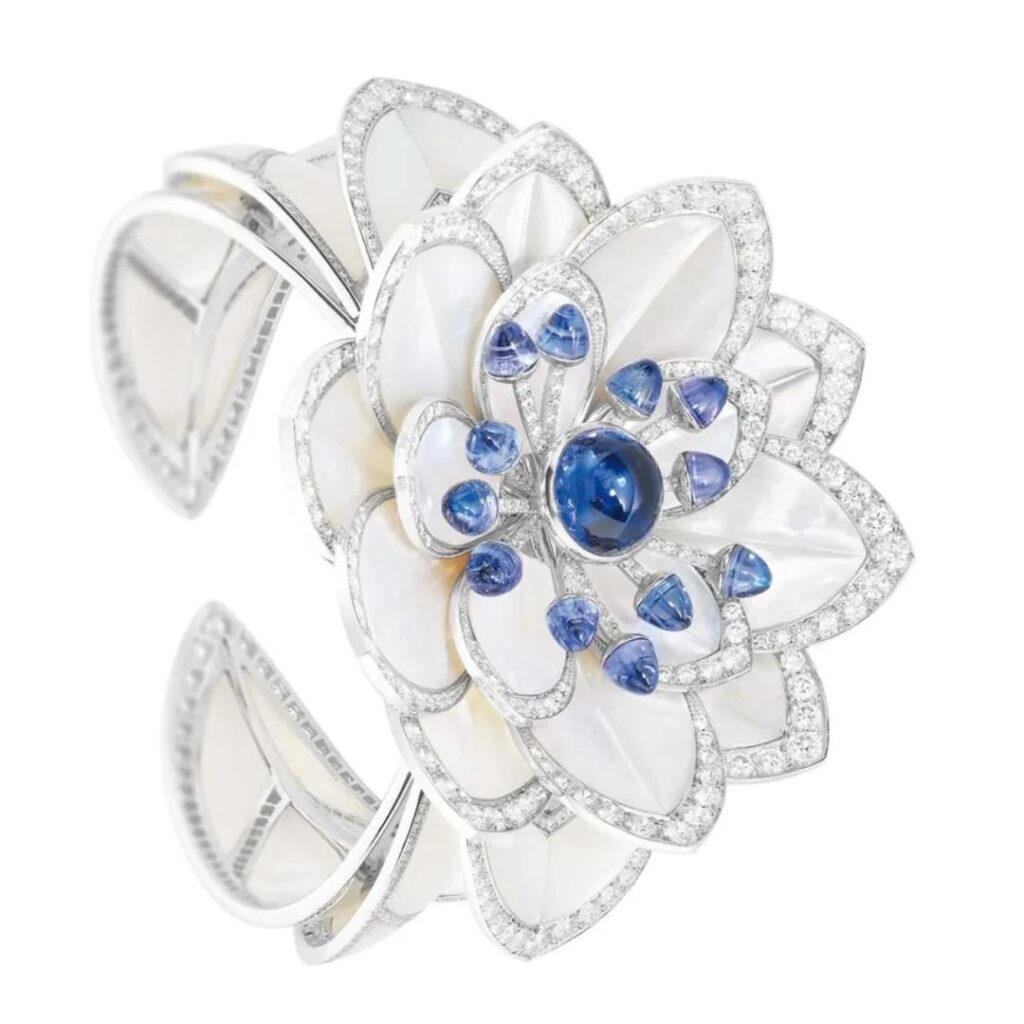
Rêves d’Ailleurs high jewelry collection
Cuff bracelet
Mother-of-pearl, sapphires, diamonds
In 2020, she launched the Contemplation high jewelry collection. The Fenêtre Sur Ciel necklace in this collection interweaves mother-of-pearl and diamonds on a flexible metal mesh, then spray-painted with blue sky and white cloud patterns. It wears softly and comfortably, just like the pleasure brought by a clear sky and floating clouds.
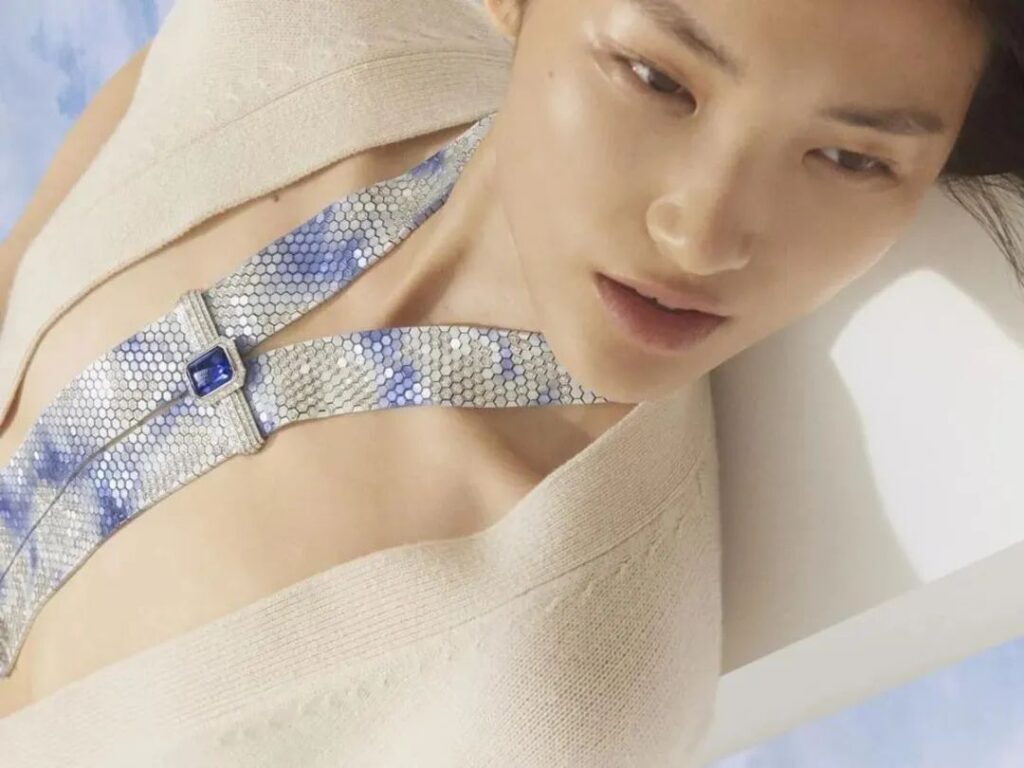
Contemplation high jewelry collection
Fenêtre Sur Ciel necklace
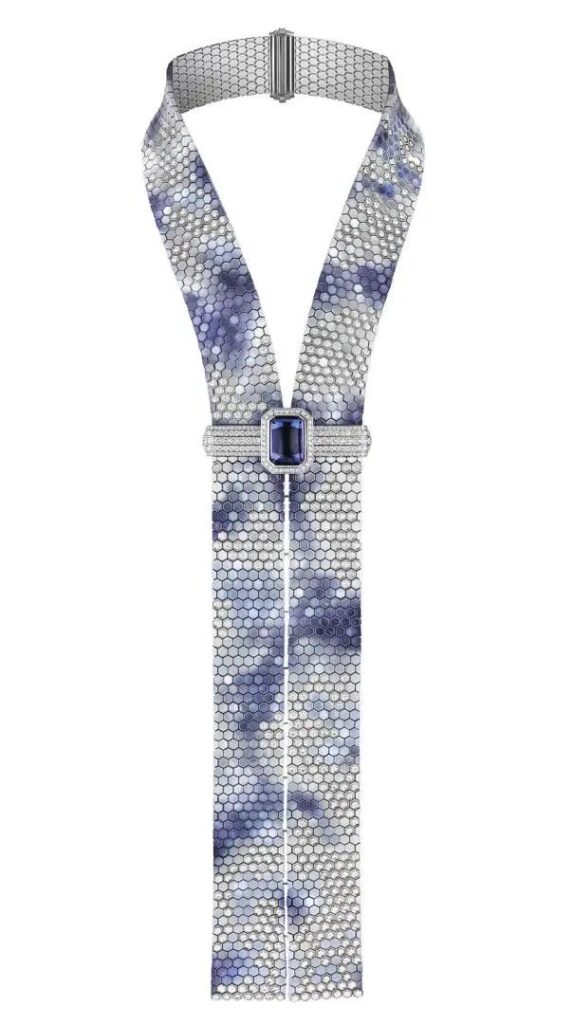
Contemplation high jewelry collection
Fenêtre Sur Ciel necklace
Her most representative work should be the Pearl Soap Bubble necklace from the 2023 Carte Blanche, More is More high jewelry collection. Using white gold, aluminum, mother-of-pearl, diamonds, and sapphire glass, it created a huge pearl bubble with a visual illusion effect. Though flat, it creates a three-dimensional feel through clever material mixing.
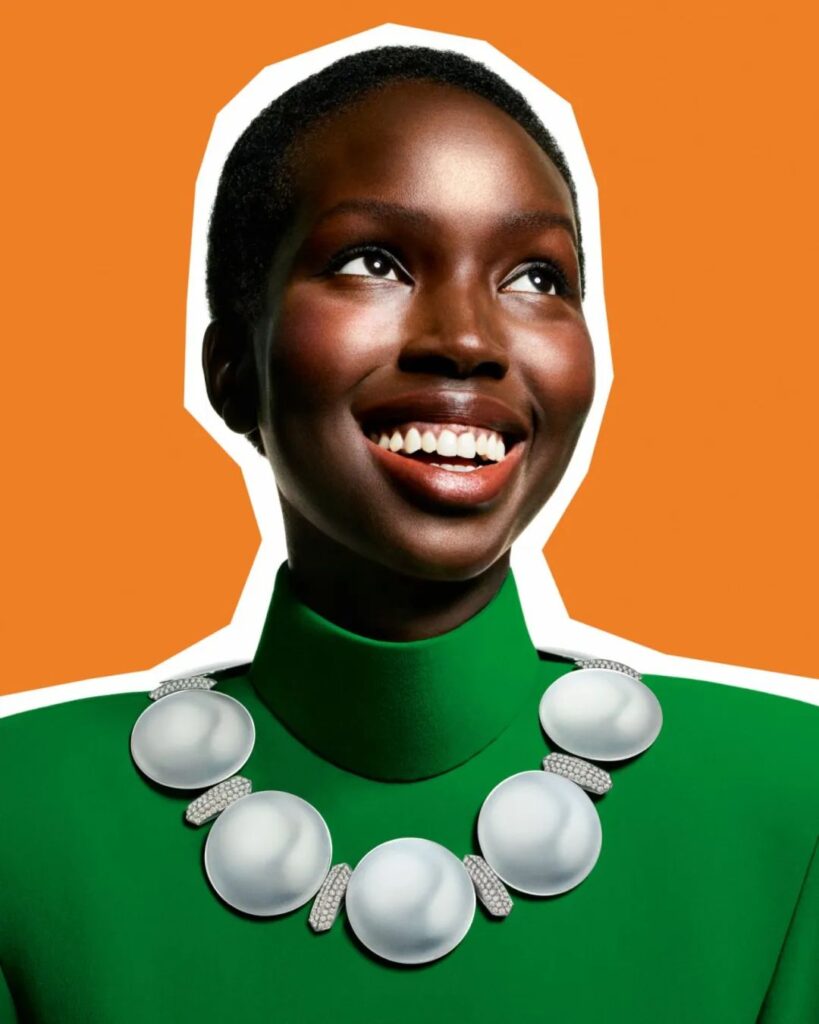
Carte Blanche, More is More high jewelry collection
Pearl Soap Bubble necklace
White gold, aluminum, mother-of-pearl, diamonds, sapphire glass
Has the charm of mother-of-pearl exceeded your imagination? It may be inconspicuous inside the shell, but in the hands of jewelry designers, it can bloom with different styles. This summer, this gemstone material with an inherent cool texture is really worth considering!
Mother-of-Pearl: The Unsung Hero That Can Increase Its Value 100-Fold Through Craftsmanship!
Tweet
